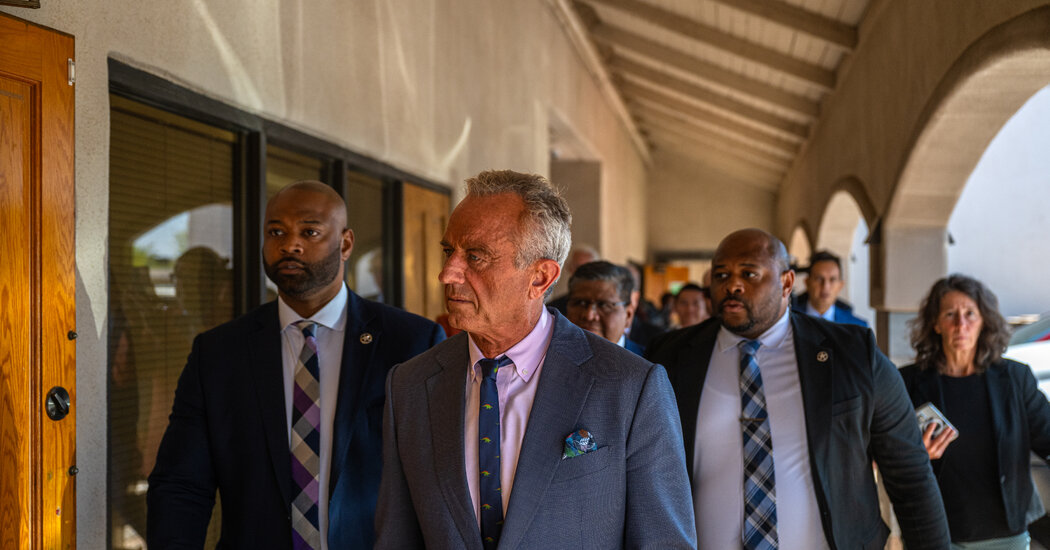At the very moment that Health Secretary Robert F. Kennedy Jr. was set to take the stage, the governor of Gila River Indian Community was still standing at the podium, articulating his uneasiness around recent Trump administration moves.
“Let me repeat that: We have spent a good part of this year providing education on why tribes have a political status that is not D.E.I.,” Gov. Stephen Roe Lewis said to a room of 1,200 people, who clapped and cheered.
When it comes to cuts sought by what has been called the Department of Government Efficiency, “we need a scalpel and not a chain saw approach to making these changes,” he said.
The Gila River Wild Horse Pass Resort and Casino in Chandler, Ariz., owned and operated by two tribes, was the latest stop on Mr. Kennedy’s Make American Healthy Again tour through three Southwestern states. Mr. Kennedy was set to host a “fireside chat” at the Tribal Self Governance Conference, an event celebrating 50 years of tribal sovereignty under the Indian Self-Determination and Education Assistance Act.
The act, passed by Congress in 1975, marked a shift away from federal government control, so that Native communities could run their own programs based on their unique cultural needs.
Mr. Kennedy has long expressed a particular zeal for improving tribal health, citing his family’s long history of advocacy, his childhood trips to American Indian reservations, and parts of his own environmental career.
But the encounter came at an awkward moment. Mr. Kennedy’s agency has laid off senior advisers for tribal issues at the federal Administration for Children and Families, terminated employees at the Centers for Disease Control and Prevention’s Healthy Tribes initiative and shut down five regional offices that served large swaths of the Indigenous population.
Mr. Kennedy’s recent decision to reassign high-ranking officials to remote Indian Health Service locations seemed to many more like a sort of political banishment than a serious attempt at supporting Native groups.
When Mr. Kennedy was welcomed onstage for the chat — pink and yellow lights swirling through the auditorium — he took care to shake hands with every tribal leader at the table. He opened the discussion by announcing that parts of the Indian Health Service would be exempt from several recent executive orders.
The tone was collegial as officials discussed strategies for improving the health of tribal communities, often with consensus. Mr. Kennedy described his worries over the high rates of obesity among Native groups. “If we’re really going to change public health on the reservations and end this crisis, we need to address what’s causing the crisis, which is food systems,” he told the tribal officials. His words were met with applause.
Still, there were moments of disconnect. Mr. Kennedy veered into stories about his childhood, citing powwows on Martha’s Vineyard where his father took him to taste “some of the best oysters.”
And then there was the announcement that Mr. Kennedy planned to have Indigenous groups test out “robotic nurses” — A.I. voices that could serve as substitutes for human health care providers, by calling patients as a way to circumvent challenges with health care delivery.
“We are going to try to roll out systems like that in Indian Country — we’d like to make Indian Country pilot programs for these kinds of systems,” he said, triggering boos from the crowd.
“Well,” he added, “there are some places that don’t have access to doctors. These are remote places, for example, in Alaska.”
Mr. Kennedy’s work on behalf of Indigenous communities dates back to the 1990s, when he represented various groups in negotiations to halt dam construction projects, oil development and industrial logging in several countries. He was also one of the first editors of North America’s largest Native American newspaper, Indian Country Today.
At his confirmation hearing, Mr. Kennedy pointed to a multigenerational frustration with health care for tribal groups. He testified that his father, Robert F. Kennedy, and uncle, President John F. Kennedy, had been “deeply, deeply critical of the function of the Indian Health Service back in 1968 to 1980, and nothing’s changed. Nothing’s gotten better,” he said.
In an exchange with Senator Lisa Murkowski, Republican of Alaska, at the hearing, Mr. Kennedy vowed to install a Native leader at the assistant secretary level of the department and to tackle unique cultural and logistical challenges of providing high-quality health care to tribes using tools like telemedicine.
But Ms. Murkowski ticked aloud through an array of health issues on which Native Americans have fallen far behind other ethnic groups, including depression, substance use, hypertension and stroke. She also rattled off infectious diseases that the groups have proven vulnerable to — hepatitis A, hepatitis B, meningitis, whooping cough and measles — and asked Mr. Kennedy to use his influence to build confidence in vaccines.
He did not directly address that request.
On Tuesday Mr. Kennedy also visited Native Health, a federally qualified health center that serves Native Americans in the Phoenix area through four primary care clinics and a food pantry to help patients with diabetes prepare Indigenous recipes.
The secretary’s staff said his tour would bring more outreach to tribal groups, including a Wednesday visit to a charter school in New Mexico that serves mostly Native students, and a hike with leaders of Navajo Nation.
Mr. Kennedy ended the day with a news conference at the Arizona State Capitol, where he defended his agency’s response to the ongoing measles outbreak in West Texas by calling it “a model for the rest of the world.”
When a reporter approached the microphone and began asking about his views on the MMR vaccine, the reporter was booed away by parents and other attendees, several of them calling for the journalist to be removed from the room.
